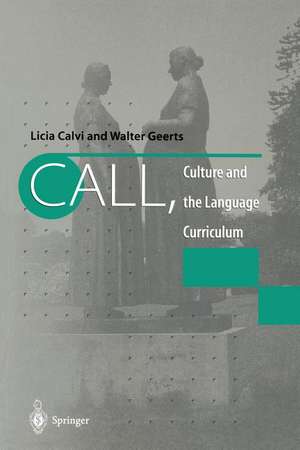CALL, Culture and the Language Curriculum
Editat de Licia Calvi, Walter Geertsen Limba Engleză Paperback – 27 ian 1998
Preț: 635.01 lei
Preț vechi: 747.06 lei
-15% Nou
Puncte Express: 953
Preț estimativ în valută:
121.51€ • 127.19$ • 101.13£
121.51€ • 127.19$ • 101.13£
Carte tipărită la comandă
Livrare economică 31 martie-14 aprilie
Preluare comenzi: 021 569.72.76
Specificații
ISBN-13: 9783540761921
ISBN-10: 3540761926
Pagini: 184
Ilustrații: XVII, 163 p. 11 illus.
Dimensiuni: 155 x 235 x 10 mm
Greutate: 0.27 kg
Ediția:1st Edition.
Editura: SPRINGER LONDON
Colecția Springer
Locul publicării:London, United Kingdom
ISBN-10: 3540761926
Pagini: 184
Ilustrații: XVII, 163 p. 11 illus.
Dimensiuni: 155 x 235 x 10 mm
Greutate: 0.27 kg
Ediția:1st Edition.
Editura: SPRINGER LONDON
Colecția Springer
Locul publicării:London, United Kingdom
Public țintă
ResearchDescriere
A consensus seems to exist on the following. In foreign language acquisition methodology sound methods and efficient tools have been developed until now in order to allow the learner to master and put into practice grammar, basic vocabulary and frequent communicative rules. Within this area Computer Assisted Language Learning (CALL) has become an indispensable partner, often leading the game. Beyond these borders, however, methodology as a whole becomes more blurred. Rules seem to vanish, variation and specialisation increase. Intuitive and ad hoc approaches seem to take the lead on formally established methods. The reasons for this are obvious: how to control the enormous, ever changing and expanding set of data, links and encyclopedic information that we associate with a richly developed human language? In front of this overwhelming opponent the search for method often surrenders. This is the point where CALL could offer foreign language learning the opportunity to make another jump forward. Information technology is capable of handling and streamlining huge and complex amounts of information. But this is also the point where language crosses the border of the purely linguistic fact, and where language learning has to come to terms with what we would call "cultural" issues.
Cuprins
Invited contributions.- Keith Cameron: “C.A.L.L., Culture and the Language Curriculum: An Important Issue?”.- Nina Garrett: “Rubrics for Teaching Culture. Implications for CALL”.- CALL and the Study of Culture.- Ronald Soetaert and Rob Van Kranenburg: “Cultural Studies in Language Teaching. Culture and Language in a Network”.- Marie J. Myers: “Facilitating Socio-centered Learning with Possible Computer Applications”.- The Language Tutor.- Patrick Boylan and Alessandro Micarelli: “Learning Languages as “Culture” with CALL”.- Antonio Borraccino: “Feedback on Steroids”.- Tandem Learning.- Tim Lewis and Ursula Stickler: “Intercultural Learning on the Internet. Some Uses of Networked Computing in Preparing for Study Abroad”.- Elke St. John: “Teaching, Typing, Talking. Two Case Studies”.- CALL: Case Studies on Phonology and Linguistics.- Anne King and Rob Procter: “‘Click and Listen’: A Case Study of the Development of a CALL Package”.- Chris Gledhill: “Learning a ‘Genre’ as Opposed to Learning ‘French’. What can Corpus Linguistics tell us?”.- CALL: Focus on Business Languages.- Valérie Gauthier: “Cross-Cultural Language Teaching with Multimedia Tools”.- Marie-Thérèse Claes: “Multimedia Learning: Implications for Language as a Medium”.- Author Index.
